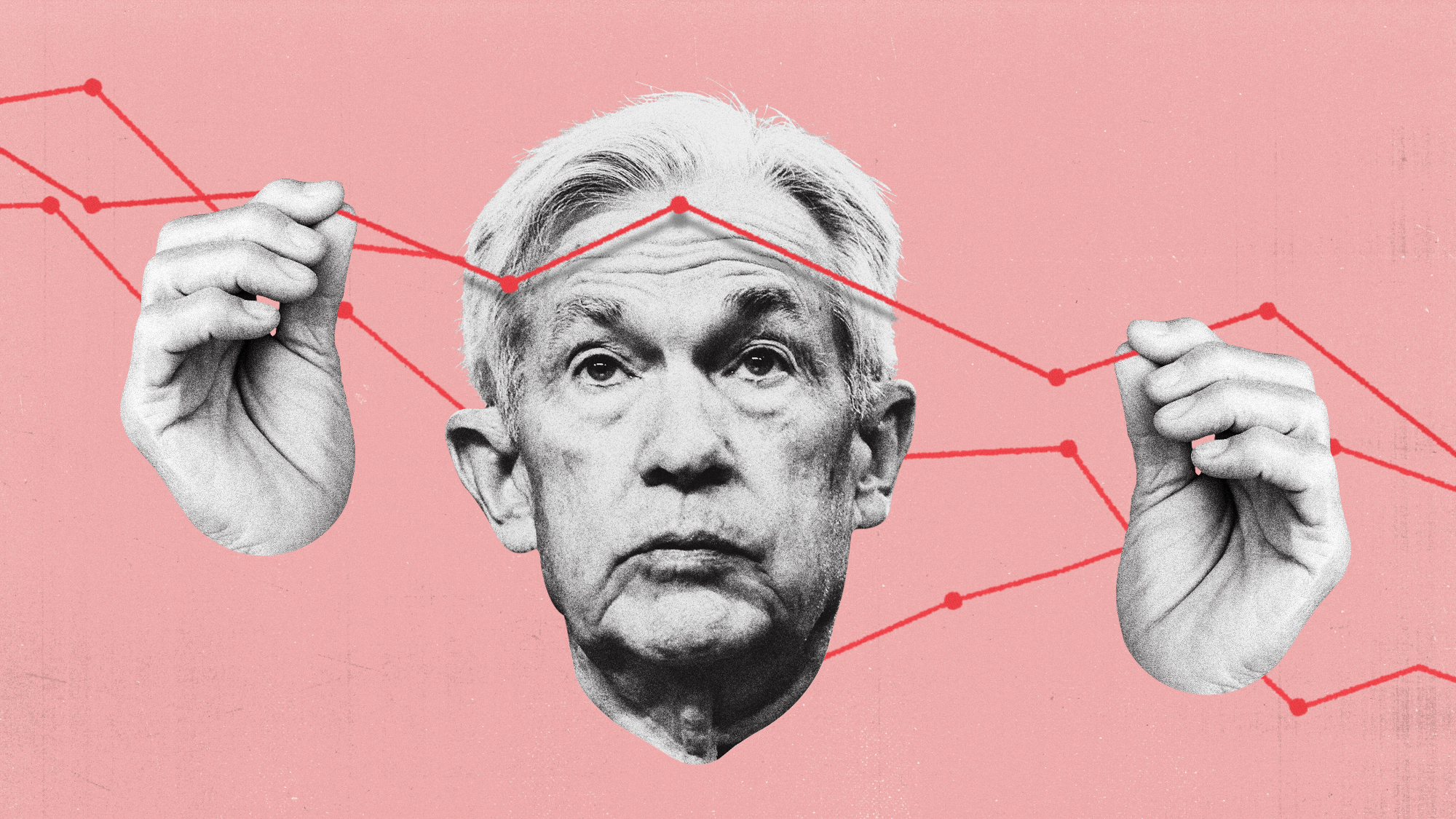How will the Fed manage Trump's economy?
Trump's tariffs have put Jerome Powell 'in a bind'


A free daily email with the biggest news stories of the day – and the best features from TheWeek.com
You are now subscribed
Your newsletter sign-up was successful
President Donald Trump has long been jealous of the Federal Reserve's power over the American economy. With stocks falling and tariffs rising under Trump's watch, however, the world's financial experts (and a whole bunch of folks on Wall Street) are looking to see how the Fed responds to sudden instability.
Federal Reserve Chair Jerome Powell plans to "remain cautious" about making any big policy changes, at least for now, said The Washington Post. The Fed does "not need to be in a hurry" to respond to the president's flurry of actions that have heightened uncertainty in the markets, Powell said Friday. Instead, "we are focused on separating the signal from the noise as the outlook evolves." The Fed is "well positioned" to handle the "risks and uncertainties" of the new economy, he added.
Trump's tariffs have put Powell "in a bind," said Politico. The trade fees are "likely to slow the economy," which would usually prompt the Fed to lower interest rates. But they could also spark a new round of inflation, which would normally push rates upward. The uncertainty is why Powell and the Federal Reserve are waiting to see whether "slow growth or spiking prices" poses a "bigger long-term risk to the economy," said the outlet.
The Week
Escape your echo chamber. Get the facts behind the news, plus analysis from multiple perspectives.

Sign up for The Week's Free Newsletters
From our morning news briefing to a weekly Good News Newsletter, get the best of The Week delivered directly to your inbox.
From our morning news briefing to a weekly Good News Newsletter, get the best of The Week delivered directly to your inbox.
What did the commentators say?
Trump "may have found a way to force the Federal Reserve to lower interest rates," said Nir Kaissar at Bloomberg. It is no secret that the president "wants more say in monetary policy" and that he wants interest rates lowered. Powell and the Fed have so far managed to defend their independence. But Trump "may have a back door" to push the central bank in his desired direction, Kaissar said: If Trump's actions coincide with an economic slowdown, the Fed "will likely act."
Central banks like the Fed have "long been the lead policy actors in world markets and economies," said Mike Dolan at Reuters. But they may be stepping back as "governments grab the limelight." Trump has forced a "dramatic re-casting of the global economic script" with his trade wars, unnerving businesses and consumers. The uncertainty means the Fed "can barely make an accurate forecast for what's going to happen next week," much less plan for the longer term. It is a "good bet the Fed will sit on its hands for a while longer" before taking action.
What next?
"Don't expect Trump or Powell to bail out investors" as the stock market continues to slide, said MarketWatch. A "lack of progress" in slowing inflation has "effectively tied the Fed's hands" when it comes to lowering rates. Many investors believe that the "administration still has a pain threshold" for how far it will allow stocks to fall before it reverses course. That hasn't proven true so far. "I'm not sure what kind of decline will get them to move," said George Cipolloni at Penn Mutual Asset Management.
A free daily email with the biggest news stories of the day – and the best features from TheWeek.com
Joel Mathis is a writer with 30 years of newspaper and online journalism experience. His work also regularly appears in National Geographic and The Kansas City Star. His awards include best online commentary at the Online News Association and (twice) at the City and Regional Magazine Association.
-
 Switzerland could vote to cap its population
Switzerland could vote to cap its populationUnder the Radar Swiss People’s Party proposes referendum on radical anti-immigration measure to limit residents to 10 million
-
 Political cartoons for February 15
Political cartoons for February 15Cartoons Sunday's political cartoons include political ventriloquism, Europe in the middle, and more
-
 The broken water companies failing England and Wales
The broken water companies failing England and WalesExplainer With rising bills, deteriorating river health and a lack of investment, regulators face an uphill battle to stabilise the industry
-
 Is the US in a hiring recession?
Is the US in a hiring recession?Today's Big Question The economy is growing. Job openings are not.
-
 Leadership: A conspicuous silence from CEOs
Leadership: A conspicuous silence from CEOsFeature CEOs were more vocal during Trump’s first term
-
 Powell: The Fed’s last hope?
Powell: The Fed’s last hope?Feature Federal Reserve Chairman Jerome Powell fights back against President Trump's claims
-
 Did markets’ ‘Sell America’ trade force Trump to TACO on Greenland?
Did markets’ ‘Sell America’ trade force Trump to TACO on Greenland?Today’s Big Question Investors navigate a suddenly uncertain global economy
-
 The end for central bank independence?
The end for central bank independence?The Explainer Trump’s war on the US Federal Reserve comes at a moment of global weakening in central bank authority
-
 Will Trump’s 10% credit card rate limit actually help consumers?
Will Trump’s 10% credit card rate limit actually help consumers?Today's Big Question Banks say they would pull back on credit
-
 Can Trump make single-family homes affordable by banning big investors?
Can Trump make single-family homes affordable by banning big investors?Talking Points Wall Street takes the blame
-
 How prediction markets have spread to politics
How prediction markets have spread to politicsThe explainer Everything’s a gamble
